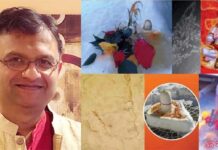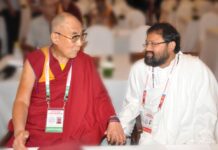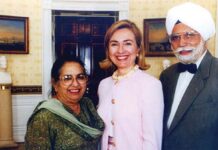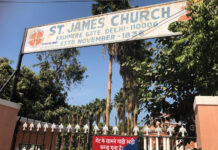On Father’s Day, Ashok Bhargava Vancouver author remembers his parents while growing up as a kid in Punjab
By Ashok Bhargava
VANCOUVER: India is one of the most diverse, intriguing and culturally affluent countries in the world. India has given birth to many religions, spiritual philosophies, social ideologies, eminent politicians and professionals. In this unique country, the railway stations are a microcosm of this diversity.
During summer vacations, we used to visit our paternal village. Travelling by train used to be the highlight of our trips. Many of those trips entailed a wedding or a mundan ceremony (customary shaving off the hair before the first birthday of a child, according to Hindu tradition) and a visit to the Jathere (a memorial place of ancestors) of our family to pay our respects.
We would wake up early, get ready and take a rickshaw to the railway station. We would get so excited waiting for the train that sometimes we were scolded or warned to calm down. Travelling by train was always an exhilarating experience of sights and smells, anxiety and chaos, dramatics and naivety, poverty and abundance, as passengers struggle to get on board and occupy a seat by the window.

As the train would slowly push forward to reach its cruising speed of 50 km per hour, a gentle rocking would develop alongside a strangely soothing noise of the railway lines, sending most of us off to deep sleep. My father would often leave us to visit the railway guard on duty. After the train arrives at Dasuya, we had to take a bus through a narrow and dusty road to our village.
Back then, steam locomotive engines were powered by burning coal and it used to generate a lot of black smoke and soot that soiled clothes and got in the eyes. Now I don’t remember the context but my father told me once “don’t cry, if smoke gets into your eyes” and it became the motto of my life. Whenever I face any problem or insurmountable difficulty, I remember his prophetic advice and face the situation bravely.
My father was Bakhshish Chand Bhargava from Garh Diwala, a village near Dasuya, in Hoshairpur district and my mother Vidya Wati, from the town of Mukerian in Punjab. She married my father at the tender age of nine as per tradition in 1923 and was six years after the wedding that she was sent to live with her husband when she was a fifteen year old girl. He was a passenger train railway guard, also known as conductor, customer service inspector or train manager.
He was a role model for many young people in his village and they looked to him for guidance. Being the first in our family to graduate from a high school and seek job opportunities in the city, he was the envy of many. He was a very kind person with a heart of gold. My father was a very special person who did wonderful things for the poor and needy. He worked hard throughout his life. He was a very responsible, dependable, loyal and conscientious person. He was always friendly to those who were socially-deprived, hurting or not loved.
After graduating from high school, my father joined Indian Railways and started as a goods clerk at Shakurbasti railway station in west Delhi. In a short time he progressed to be a goods train guard, in charge of running freight trains and was promoted again to the position of a passenger train guard. These promotions and transfers caused him to move from Shakurbasti to many different cities such as Saharanpur (U.P.), Lyallpur, Lahore (both cities in Pakistan now) and finally to Jalandhar (Punjab). Of all the places, my parents liked Layallpur most. This city was named after Sir James B. Lyall, the Lt. Governor of the Punjab in the 1890s.
In 1979, Lyallpur was renamed Faislabad by the government of Pakistan in honour of King Faisal of Saudi Arabia who was shot dead in 1975 by his half-brother’s son. My parent’s favourite was a brick Clock Tower located in the city centre from where eight roads emanated and a town spread out in concentric circles. Our house was off one of these roads on the Chenab river. He was well liked by his co-workers and passengers because he was smart looking and had very pleasant manners. He had a good memory for regulations, safety procedures, fares and schedules. He knew how to approach people and had excellent communication skills for talking to passengers.

My parents had ten children, eight sons and two daughters, of whom I am the third youngest. Large families were common in those days, though ours was somewhat larger than most. Life was very simple in those days. We had a cow to fulfill our requirements of milk, butter and yogurt. My father was the only earning member of the family, supporting such a large and diverse household. On top of our big family, there was no dearth of semi-permanent guests moving in for extended stays, distant cousins, the children of family friends about to embark upon their studies or jobs or vacation. However, since my father was a kind person, he accommodated everyone with love and affection.
My father said that we must study hard to have a comfortable future because he valued the importance of education. He had many messages for us, for example, never be a quitter, work hard, don’t waste time on trivial matters, trust yourself, don’t judge other people and be kind to others. I have summarized all these messages under what he once said “don’t cry when smoke get in your eyes” and I have never forgotten these words.
My father was a man I respected and deeply admired. I miss my father a lot. He died when I was in my 20s. I often wonder what it would be like to have him around when I had important things happening in my life such as the births of my children, my first book launch and receiving literary awards. I wish he was here to travel with me and my family.
He genuinely loved his family and friends. He believed that when you love and appreciate others, no explanation or justification is needed because you are understood. I miss you Bauji very much even today and you are still there when I need you.
(Vancouver-based Ashok Bhargava is the president of Writer International Network (WIN) Canada)
READ ALSO: How lady pal pen brought Ashok Bhargava to Canada








